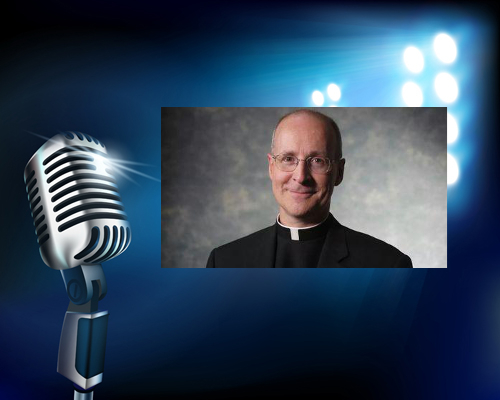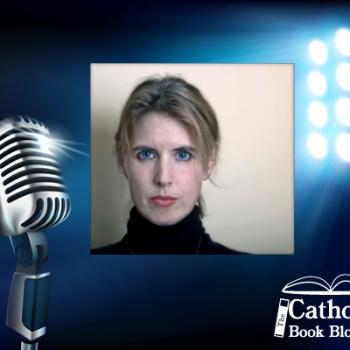The Rev. James Martin, S.J., is a Jesuit priest, author and editor at large at America, The National Catholic Review.
James Martin was born in Plymouth Meeting, Pa., and graduated from the University of Pennsylvania’s Wharton School of Business in 1982, where he received his bachelor’s degree in economics (B.S. Econ.) with a concentration in finance. After working for six years in corporate finance with General Electric in New York City and Stamford, Ct., he entered the Society of Jesus (the Jesuits) in 1988.
Father Martin is the author of several books. His most recent book is Jesus: A Pilgrimage (HarperOne), a
New York Times bestseller and the winner of a Christopher Award, which combines travel narrative, biblical study and spiritual reflections on the life of Christ. In 2011, he published Between Heaven and Mirth: Why Joy, Humor and Laughter are at the Heart of the Spiritual Life, (HarperOne), which was named as one of “Best Books” of the year by Publishers Weekly. In 2013 HarperOne published an e-book Together on Retreat: Meeting Jesus in Prayer, which uses the technology of the e-reader to lead readers on a guided retreat.
Here we discuss his latest book Seven Last Words.
PETE: One of the things I took away from your book Seven Last Words was your focus on the humanity of Christ. Why is it important for people not to forget that aspect of our Lord?
FATHER JAMES MARTIN: Well, it’s important to remember that Jesus was fully human and fully divine, at least in mainstream Christian belief. But our focus on the parts of his life that we normally associate with his divinity—his healings and nature miracles, raising people from the dead and his own resurrection—tend to make us think of him as only divine. So it’s important to remember that he was human at the same time. Admittedly, this is a mystery that we’ll never fully comprehend: how could have two “natures,” as theologians say, at the same time? But we must never forget his humanity.
The seven last “words,” or sayings, that he uttered from the Cross on Good Friday are a vivid reminder of that humanity. We hear Jesus express physical pain of course—not only in the cries from the Cross but also in his words “I thirst.” That’s a powerful reminder that he had a human body, and so understands the aches and pains of our physical lives. And we hear his spiritual pain when he cries out “My God, my God, why have you abandoned me?” Remembering that he had human experiences reminds us that he understands us in the fullest way possible. And that’s really the theme of the book: Jesus understands us. Understands you.
PETE: Can you tell us about the history of preaching on the topic of the Seven Last Words?
FATHER JAMES MARTIN: That’s a little obscure. Around the second century AD, there were attempts to “order” the Seven Last Words to give them some coherence. That is, first, second, third and so on. (Because most of them do not appear in all four Gospels.) Some people date liturgical ceremonies that center around the sayings from as far back the 16th century. But it is difficult to pinpoint their origins with precision. Today we can at least say that the current practices extend throughout churches in various Christian denominations, and is usually a part of the Good Friday services in a cathedral or church. Composers have also used the Seven Last Words as settings for chorale pieces. Normally, the liturgies of the Seven Last Words include some combination of prayer, music and reflections.
Most churches choose seven different speakers to reflect on each of the sayings, sometimes from various Christian denominations. In the Jesuit church in New York where I often celebrate Mass, the pastoral team usually invites Episcopal priests (both men and women), Baptist pastors, Lutheran clergy, members of Catholic religious orders, and lay men and women from various walks of life, for a wide variety of perspectives on Good Friday.
PETE: This book has its foundation in preaching you gave on the topic at Saint Patrick’s Cathedral in New York. How did that come about and how did you decide to put this into book format for publishing?
FATHER JAMES MARTIN: Cardinal Timothy Dolan, archbishop of New York, invited me to preach at St. Patrick’s, and needless to say it was a great honor and I said yes immediately. Funny enough, when I first was invited, I realized that the tradition at the cathedral was for one speaker to speak on all seven of the last words. Upon hearing that, a Jesuit friend of mine exclaimed, “All seven? Just you?”
But it was a wonderful experience to meditate on all seven together and then to write up my meditations. Even as I was doing it, I thought, “This might make a nice little book.” Afterwards I used my meditations as the basis for seven individual chapters, and I added an introduction explaining the Seven Last Words (and their place in the Gospels) and a concluding chapter about my overarching theme, which is, as I mentioned: Jesus understands us.
PETE: Lent is upon us. What suggestions do you have for people to help them make this a more meaningful time?
FATHER JAMES MARTIN: For me, it’s good to decide to do something positive in addition to giving something up. Giving things up is a good thing—it can help you save money that you can give to the poor, and it reminds you that you have a will. But it’s also good to do something positive. Lately, I think it’s good simply to resolve this: Be kind. And there are three ways of doing that. First, don’t be a jerk. That’s hard, too. Especially when you’re tired or sick or angry. It’s important to remember that there’s no need to pass along your misery to everyone else. So, again, don’t be a jerk. Second, honor the absent. That is, stop gossiping about people behind their backs. Third, give people the benefit of the doubt. Give them the “plus sign,” as an old Jesuit used to say.
Being kind is great for your soul—and everyone else’s. And I’ll bet God cares more about that than whether or not you give up chocolate.
PETE: Time for my signature ending question. It has been a while since we chatted so, what books are currently on your bookshelf to read?
FATHER JAMES MARTIN: Ah, a whole stack of them. I’m still plowing through Doris Kearns Goodwin’s book The Bully Pulpit, about Theodore Roosevelt, William Howard Taft and the Progressive Era. And I’m midway through Harvey Cox’s How to Read the Bible, whose title is self-explanatory. I’m also rereading Cosmas, or the Love of God, the beautiful story about a man who keeps toying with the idea of a monastic vocation. And believe it or not, I just finished Laura Ingalls Wilder’s The Long Winter, for the umpteenth time since I was thirteen. She could sure write: very simple and straightforward, which I enjoy. And her descriptions of the meals they ate still make my mouth water.
___________________________________________________________________________________________________________
Stay in touch! Like The Catholic Book Blogger on Facebook:
Other books by this author:
Jesus: A Pilgrimage












